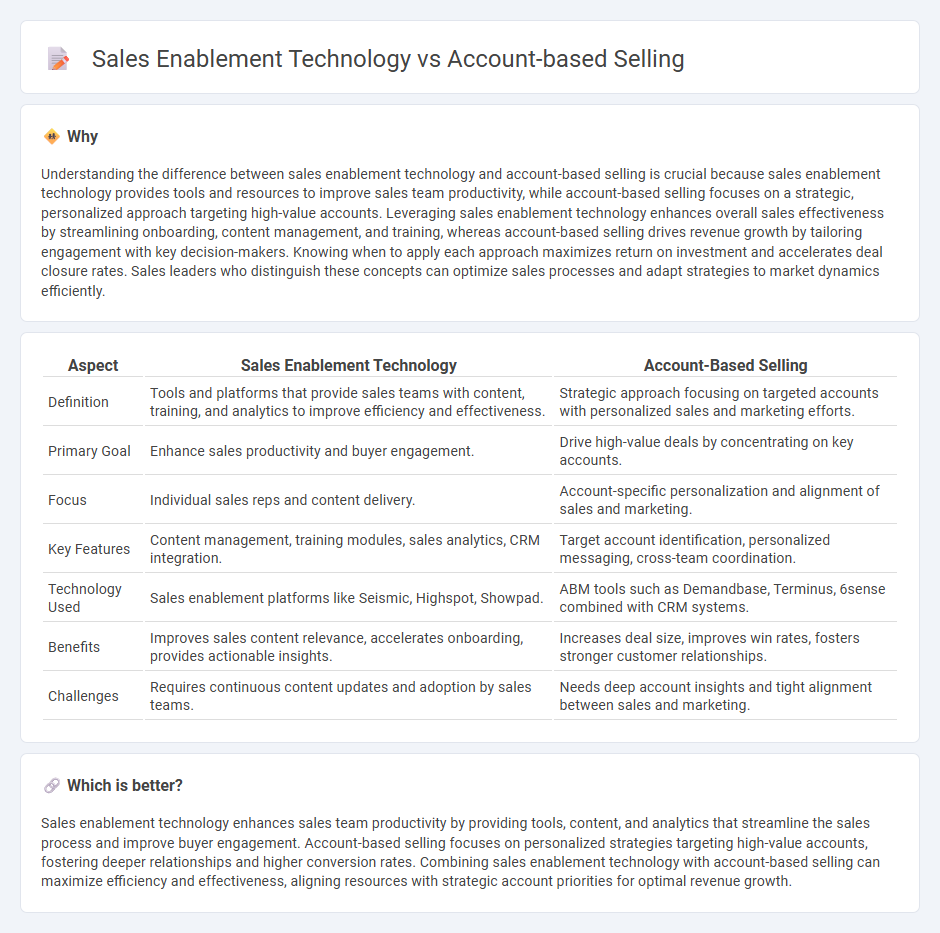
Sales enablement technology equips sales teams with tools and content that streamline workflow and enhance customer engagement through data-driven insights and automation. Account-based selling focuses on personalized strategies tailored to high-value accounts, leveraging targeted messaging and collaborative efforts across marketing and sales teams. Explore how integrating these approaches can optimize your sales performance and drive revenue growth.
Why it is important
Understanding the difference between sales enablement technology and account-based selling is crucial because sales enablement technology provides tools and resources to improve sales team productivity, while account-based selling focuses on a strategic, personalized approach targeting high-value accounts. Leveraging sales enablement technology enhances overall sales effectiveness by streamlining onboarding, content management, and training, whereas account-based selling drives revenue growth by tailoring engagement with key decision-makers. Knowing when to apply each approach maximizes return on investment and accelerates deal closure rates. Sales leaders who distinguish these concepts can optimize sales processes and adapt strategies to market dynamics efficiently.
Comparison Table
| Aspect | Sales Enablement Technology | Account-Based Selling |
|---|---|---|
| Definition | Tools and platforms that provide sales teams with content, training, and analytics to improve efficiency and effectiveness. | Strategic approach focusing on targeted accounts with personalized sales and marketing efforts. |
| Primary Goal | Enhance sales productivity and buyer engagement. | Drive high-value deals by concentrating on key accounts. |
| Focus | Individual sales reps and content delivery. | Account-specific personalization and alignment of sales and marketing. |
| Key Features | Content management, training modules, sales analytics, CRM integration. | Target account identification, personalized messaging, cross-team coordination. |
| Technology Used | Sales enablement platforms like Seismic, Highspot, Showpad. | ABM tools such as Demandbase, Terminus, 6sense combined with CRM systems. |
| Benefits | Improves sales content relevance, accelerates onboarding, provides actionable insights. | Increases deal size, improves win rates, fosters stronger customer relationships. |
| Challenges | Requires continuous content updates and adoption by sales teams. | Needs deep account insights and tight alignment between sales and marketing. |
Which is better?
Sales enablement technology enhances sales team productivity by providing tools, content, and analytics that streamline the sales process and improve buyer engagement. Account-based selling focuses on personalized strategies targeting high-value accounts, fostering deeper relationships and higher conversion rates. Combining sales enablement technology with account-based selling can maximize efficiency and effectiveness, aligning resources with strategic account priorities for optimal revenue growth.
Connection
Sales enablement technology enhances account-based selling by providing tailored content, analytics, and workflow tools that align with specific target accounts. This integration allows sales teams to deliver personalized, data-driven interactions, improving engagement and conversion rates within high-value accounts. Leveraging CRM systems and AI-powered insights streamlines collaboration between marketing and sales, optimizing account strategies for maximum revenue growth.
Key Terms
**Account-Based Selling:**
Account-Based Selling (ABS) targets high-value accounts through personalized outreach and tailored sales strategies, emphasizing relationship-building with decision-makers to accelerate deal closures. It leverages detailed account insights, predictive analytics, and multi-channel engagement to maximize revenue from specific clients. Explore how ABS integrates with modern sales enablement technology to transform your sales performance.
Target Accounts
Account-based selling centers on identifying and engaging high-value target accounts to deliver personalized sales strategies, enhancing conversion rates within specific market segments. Sales enablement technology supports this approach by providing tools such as CRM integration, content management, and analytics to streamline communication and track engagement with those target accounts. Explore comprehensive solutions to optimize your account-based selling efforts through advanced sales enablement platforms.
Personalization
Account-based selling emphasizes hyper-personalization by tailoring sales strategies to individual accounts, leveraging detailed buyer personas and firmographic data to increase engagement. Sales enablement technology supports this by providing tools for content customization, CRM integration, and analytics to optimize personalized outreach. Explore how combining these approaches can drive higher conversion rates and deepen customer relationships.
Source and External Links
What is Account-Based Selling? - DealHub - Account-based selling (ABS) is a sales strategy focused on winning business from specific high-value accounts by identifying target accounts and creating personalized sales strategies tailored to their unique needs, aiming to generate more revenue from fewer accounts through alignment with complex organizations' buying behavior.
A Beginner's Guide to Account-Based Selling | ZoomInfo - Account-based selling treats each account as a market of one, targeting companies rather than individual leads, with sales and marketing teams collaborating to nurture targeted accounts using personalized content to engage all key stakeholders within the buying committee effectively.
What is Account-Based Selling? Everything You Need to Know - TechTarget - ABS is a strategic B2B sales approach involving deep research of selected high-value accounts to develop custom outreach and personalized messaging for key decision-makers, requiring collaborative efforts across sales, marketing, and customer support to create a consistent and customer-centric experience.
 dowidth.com
dowidth.com